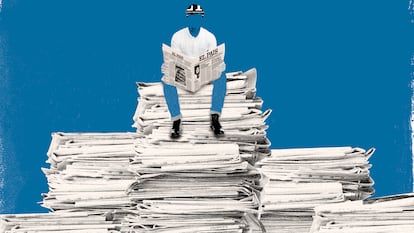A reader before an editor-in-chief
The head of EL PAÍS writes that, in the face of the pandemic of lies, journalism demands more than ever a commitment to independence and plurality

I am a reader of EL PAÍS before its editor-in-chief. It’s not something I chose. My father introduced me to that habit in the 1970s. A social democrat and Spanish republican, he belonged to that group of readers who bought the newspaper from day one. I remember him walking to the newsstand and then fearlessly carrying it under his arm, when that gesture — in a Spain that hadn’t yet held general elections or approved the Constitution — meant declaring himself a democrat in the face of the timid and those nostalgic for the dictatorship.
My father would leave the newspaper — black and white in those days — on the coffee table after reading it, and I would devour it from cover to cover, not fully understanding it but feeling the pleasure of freely browsing its stories (I still remember the shock that Elvis Presley’s death caused me at age 11, and vaguely sensing that it may have been an overdose). That reading habit has never left me and in a way, it led me to journalism — a profession I never truly felt a vocation for (archaeology was more my thing), but which drew me in when, still a university student, I began writing for very local outlets.
More than 30 years have passed since then, but I’ve always felt that a fundamental part of my work — whether as a reporter or editor — has been based on my previous experience as a reader, on the memory of the flow of articles and images that left a mark on me.
It’s not the act, but its lasting mark, that really matters. The lasting impression that a news outlet leaves on us over time, fostering trust, appreciation, and credibility. Thanks to this groundwork, we turn to an article in our newspaper knowing that if it’s an interview, it will have good follow-up questions, or that if it’s a profile of a politician, it will steer clear of partisanship or Manichaeism. In that trust lies an exchange — a form of sharing, full of intangibles — that reflects a specific way of doing journalism. A code that, in times of confusion like the present, must be defended. Not out of a desire to return to the past or fall into the game of nostalgia, but to remain steadfast in defending the values that give journalism its strength.
We live in a fractal universe where information channels have multiplied endlessly. In this new Babel, deception has found a fertile breeding ground. In many corners of the media landscape, truth has been replaced by virality — a force that, in its pursuit of results, cares little whether what it spreads is true, entirely fabricated, or somewhere in between.
Amid these currents, alternative facts — encouraged by political power and economic interests — gain more ground each day. The rise of the far right and the victories of Donald Trump and his imitators are part of this new barbarism. In a world marked by deep instability, the new alpha males attack and delegitimize institutions from within; the will to power tramples the values of consensus, which are seen as weak and outdated. What seemed unthinkable a decade ago (who would have imagined a U.S. president profiting from his office, musing about annexing Canada and Greenland, denigrating foreigners, and facilitating Putin’s dirty work?) has become reality. And in the face of that, as has so often been the case in history, we must fight for the obvious.
Truth exists, and journalists have a duty to pursue it. That pursuit does not rely on grand pronouncements, but on method — simple and clear: verifying, seeking accurate data, listening to all sides in a conflict, going to the scene, questioning official narratives, and holding power to account. These are the tools journalists use to get closer to the truth and to break away from the false equivalence that puts victims and perpetrators on the same level. We don’t always get to the bottom of every story, and sometimes we make mistakes, but the use of method (and the subsequent mechanisms to acknowledge those mistakes) ensures a publication’s integrity and helps build that lasting impression, that mark of trust and credibility.
That is what readers expect from EL PAÍS, and what has allowed us, over the years, to become a newspaper of global standing. It’s a job that, in the face of the pandemic of lies, demands more than ever a commitment to independence and plurality. Values that this newspaper has defended from day one, when Spain was still emerging from its darkest days. Today, just as then, EL PAÍS aspires to defend democracy, to be a vehicle for diversity and equality.
Last Friday, June 6, I took office as editor-in-chief of EL PAÍS, and that same day, before the editorial staff, I gave a speech in which I reaffirmed my commitment to truth and independence. Deep down (and please forgive me for being so personal) I knew I was saying this as just another reader, as someone who expects this from their newspaper so they can carry it under their arm, just as they once saw it done, with pride, in the face of democracy’s enemies.
Sign up for our weekly newsletter to get more English-language news coverage from EL PAÍS USA Edition
Tu suscripción se está usando en otro dispositivo
¿Quieres añadir otro usuario a tu suscripción?
Si continúas leyendo en este dispositivo, no se podrá leer en el otro.
FlechaTu suscripción se está usando en otro dispositivo y solo puedes acceder a EL PAÍS desde un dispositivo a la vez.
Si quieres compartir tu cuenta, cambia tu suscripción a la modalidad Premium, así podrás añadir otro usuario. Cada uno accederá con su propia cuenta de email, lo que os permitirá personalizar vuestra experiencia en EL PAÍS.
¿Tienes una suscripción de empresa? Accede aquí para contratar más cuentas.
En el caso de no saber quién está usando tu cuenta, te recomendamos cambiar tu contraseña aquí.
Si decides continuar compartiendo tu cuenta, este mensaje se mostrará en tu dispositivo y en el de la otra persona que está usando tu cuenta de forma indefinida, afectando a tu experiencia de lectura. Puedes consultar aquí los términos y condiciones de la suscripción digital.









































